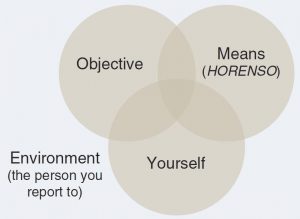“HoRenSo” for non-Japanese employees (5) Which Is Better, Verbal Reporting or Written Reporting?
CONTENTS
Which Is Better, Verbal Reporting or Written Reporting?
Q: My friend is of the opinion that reporting should be in documents. I think it is more realistic to change the way of reporting according to the situation. During a training period, we were taught that written reports are better if numbers or matters which likely to cause misunderstandings are included. They told us to use a memo pad to report rather than verbal reporting for messages taken during his or her absence. Also we were advised to write it down if we want to keep a record. In practice, sometimes there is no problem to report everything verbally, while other times we are told to write it down.
Which is right, verbal reporting or written reporting?
A: Look at HORENSO from “3 viewpoints”
Do you change your way of reporting when there is a staff reshuffle and your superior is changed? Or do you not? It was an experience Mr. S had when S was the manager of general administration in a certain company. The following is a conversation I had with S’s immediate superior, Managing Director “K.”
“It is about the XX issue. The situation is like this. Therefore, I would like to deal with it this way,” S said, and without saying anything, his superior pointed to the in-box on the desk. It meant S was supposed to put the report on the in-box.
“I am afraid it is urgent,” S said.
“If it’s urgent, then hurry up and write it and put it there!” he said.
That made S confused. At the beginning it was difficult to become accustomed to his way, but gradually S got used to it.
When his approval was not given, there was a remark written on a document, questioning about the situation of a certain thing. In such cases, S was not allowed to make a verbal reporting. S had to resubmit my report to say there were no problems regarding this issue.
When S got used to Managing Director K’s behavioral pattern (personality), S even started to feel it was easy to work with him.
However, there was a change of directors and S’s immediate superior became Vice-President N. This time, even though S submitted a draft contract for his approval, there was no reply (approval) even after a long time. S could not proceed with my work and S had to ask the Vice-President. S found that the documents were still in-box.
S said, “This is the contract with X company that I turned in the other day” and handed the document over again. “What is this? You mean I have to read it all?” he started to complain.
S was told to report verbally what was written in the document, what the problems were and the ways to handle them. If questions were posed verbally, S had to answer them verbally. If he agreed to what S said, he would sign on the document and give S his approval. Perhaps both superiors take liberties but S guesses it is not unusual for salespeople to have these kinds of customers too. Why is there a difference between the two?
How Best You Report Depends on Your Boss
Whether to make a written report or a verbal report and whether the way of reporting is good or not depend on the behavioral pattern (personality) of your superior. S realized that whether the report is good or bad is decided by the person whom you report to.

HoRenSo diagram
We tend to follow the same usual pattern of reporting. But if you bear 3 viewpoints in mind, which are “the other party”, “objective”, and “yourself”, it is easier to decide the way of reporting.
An appropriate means of reporting varies, depending on your boss, as described above.
The adequacy changes according to the objective too. First and foremost, you have to understand the objective of reporting, then select the means. This is the “objective thinking” that the real HORENSO emphasizes.
After all, HORENSO is only a formula. Let’s not be tied down to one fixed means of solving all the matters.
Go on to the next Horenso Serial (6): Try "Active Listening"


